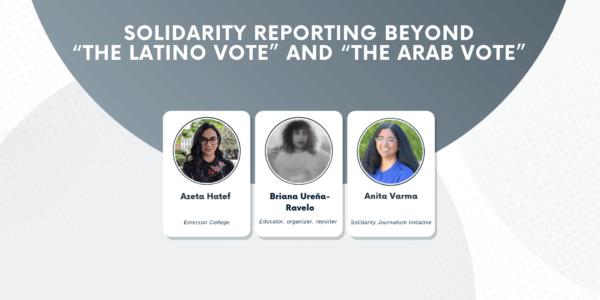
Journalists and media researchers gathered on November 20, 2024, for a virtual workshop “Solidarity Reporting Beyond ‘The Latino Vote’ and ‘The Arab Vote.’” Prompted by media discourse and criticism in the aftermath of the 2024 U.S. election, the workshop focused on encouraging journalists to move beyond reductive, monolithic labels, and identifying specific reporting practices for doing so.
Speakers included Dr. Anita Varma, who leads the Solidarity Journalism Initiative at the Center for Media Engagement at The University of Texas at Austin, Dr. Azeta Hatef of Emerson College, and Briana Ureña-Ravelo, who is an educator, organizer, and reporter with a recent piece in Prism called “What’s the deal with the Latine vote?”
Dr. Varma opened the discussion by laying out a solidarity approach to covering racial minorities’ needs, struggles, and goals. This approach moves away from a “Census logic” of fixed categories, and better accounts for multidimensional axes that shape voters’ decisions and actions.
Panelists discussed how the U.S. media election coverage often relied on homogeneous labels like “Latino voters” or “Arab voters,” and explained why these labels don’t work.
“Much of the coverage we see conflates the so-called ‘Arab vote’ with Michigan voters, Muslim voters, or those broadly from the Middle East,” said Dr. Hatef. “A group I study closely—Afghans and Afghan Americans—is often incorrectly lumped into this category as well. These voting groups reflect the limited ways in which groups are categorized in the U.S.”
Brianna Ureña-Ravelo pointed out the differences in race, class, and migration history within a category like ‘Latino.’ “We can’t say that a third-generation white Hispanic has the same class and political motivations as a first-generation or undocumented Haitian or Dominican person,” she said, sharing her own experiences of navigating multiple identities as a Black Latina person.
The panelists urged journalists to reflect on how the use of common categories do more than just erase the differences in lived experiences and identities within these groups.
“Who are these racial and ethnic categories serving? Who benefits from them, and who doesn’t benefit from treating diverse groups as if they’re a monolith?” asked Dr. Varma. “We also need to question what stereotypes and scapegoating these categories reinforce and perpetuate when journalists use them. Do these so-called standard racial and ethnic categories allow us to be multidimensional voters, or are we being confined to singular boxes?”
Solidarity reporting practices prioritize the voices of those directly impacted by the issues being covered, Dr. Varma explained. These practices involve shifting from top-down approaches that prioritize elite perspectives to prioritizing communities’ struggles and resulting political commitments. “Solidarity reporting is when commitment to social justice translates into actions of journalism that include using solidarity newsworthiness criteria. Instead of looking at where elites are discussing matters, we look at where people and communities are coming together to struggle and survive,” she said.
Ureña-Ravelo stressed the need for clarity and specificity instead of clumping people into labels like ‘Hispanic.’ She urged journalists to identify communities using precise language, such as “Mexican Americans in Chicago,” and address intersecting factors like race, ethnicity, class, and region of origin.
Dr. Hatef asked journalists to resist overgeneralizations and instead ask individuals how they choose to identify. “I think it’s important to ask people how they choose to identify,” she noted, adding, “Perhaps someone is like, yes, I’m Arab American, I’m African American—however they choose to identify. Give folks the agency to be able to identify how they wish.”
To view the recording of the workshop, visit https://www.youtube.com/watch?v=OrgGtc_7FNA
For free resources, examples, and guidance on how to do solidarity reporting, please visit https://mediaengagement.org/solidarity-journalism.
The Solidarity Reporting Initiative is a research-based effort with grant support from Democracy Fund, and past grant support from the American Council for Learned Societies. For peer-reviewed research on solidarity journalism, see https://mediaengagement.org/solidarity-journalism-academic-research/


